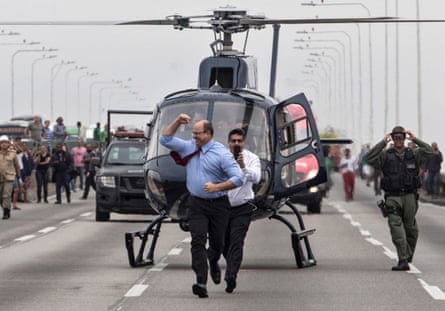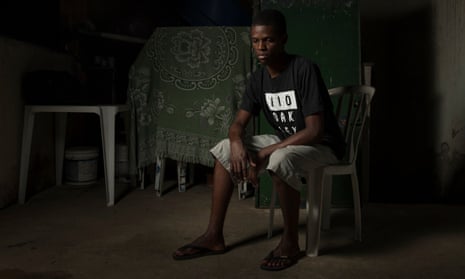Night has fallen on Rio de Janeiro’s Albert Schweitzer hospital, and in its 11th-floor intensive care unit Enzo Coutinho dozes in his aunt’s lap.
“Sometimes it takes a mountain to trust and believe in you,” Merielle Ventura, a 24-year-old nursery teacher, sings gently into her nephew’s ear.
It has been five days since baby Enzo became one of the youngest victims of a new and deadly chapter in Rio de Janeiro’s intractable war on drugs – gunned down with his teenage mother, Margareth Teixeira, as she carried him to church. His mother was killed.
Doctors have placed a television beside the injured infant’s bed, hoping Tom and Jerry cartoons will distract Enzo as they sedate him to clean the bullet wound that nearly cost him his left foot.
When he cries out for his mother, family members still struggle to respond. Sometimes it is Enzo’s aunt he calls mum; sometimes his grandmother. Only 48 hours have passed since weeping relatives laid his mother to rest. She was 17 years old.
Margareth was one of at least four innocent teenagers shot dead during police operations between 9 and 13 August – an eruption of killing that was shocking even by Brazilian standards, where there were over 57,000 homicides last year.

“In Rio, killing is a game,” one local tabloid announced on its front page alongside an illustration of blood-spattered Playmobil figures symbolizing Rio’s extinguished youth.
The killings are part of a broader surge in police violence playing out under Rio’s hardline state governor, Wilson Witzel, who took power in January promising a frontal assault on the drug gangs who rule most of Rio’s 1,000-odd favelas.
Official figures released this week show Witzel – who hopes to succeed Brazil’s far-right president, Jair Bolsonaro – has been true to his word, with devastating consequences for families like Margareth’s.
In the first seven months of this year police caused 30% of all violent deaths in the state of Rio and killed a record 1,075 people – the highest number in more than two decades. Eighty-eight of those deaths came in the western region where Margareth and Enzo were shot.
In July alone police killed 194 people – a rate of more than six a day – another two-decade high.
“It is staggering,” said Pablo Nunes, a public security specialist from Rio’s Cândido Mendes University. “It leaves me almost speechless. It is something that in any other democracy in the world would be simply unacceptable and unthinkable.”
Witzel has defended his so-called “shoot down” policy, claiming it has reduced crime and insisting “no leniency” can be shown to rifle-toting gangsters he compares to Nazis.
In one chilling interview Witzel urged criminals to swap their guns for Bibles, “or we are going to kill you”.
But activists accuse the brawny former judge of triggering a bloodbath that is claiming a growing number of civilian lives.
Of the four innocent teenagers killed during recent police operations, not one was carrying a rifle.
Gabriel Alves, 18, was reportedly school-bound with a bag full of books. Dyogo Costa, 16, was on his way to a football training session with a pair of boots. Henrico de Menezes Júnior, 19, was reportedly going to pick up his motorbike from a repair shop.
And Margareth Teixeira, a student who dreamed of joining the police, was en route to a church service, carrying nothing but her 22-month-old boy.
Renata Souza, a leftist politician and human rights activist, said every single police shooting demanded thorough investigation. “But it seems the governor has no interest in this and instead is simply becoming a populist demagogue who believes in nothing but solving violence through confrontation.”
“By opting for confrontation and war, Governor Witzel is deliberately putting at risk the poor, who are caught defenseless in the crossfire,” added Souza, who recently flew to Geneva to denounce Witzel to the UN human rights council.

On the night she died, on 13 August, Margareth set off from the home of her parents-in-law with Enzo at about 7.10pm.
She had arranged to meet his father, Daniel Coutinho, at an evangelical church in the Favela do 48 community where they lived.
But moments after she left a volley of shots rang out, as police launched an incursion supposedly intended to quell clashes between two rival gangs currently squabbling over the area.
“The shooting came from nowhere,” said Margareth’s mother-in-law, Fátima Coutinho, who recalled thinking: “My God! Did she make it to church?”
When Coutinho reached the place of worship and couldn’t find his wife, he assumed she had sought shelter from the shootout in someone’s home. In fact, Margareth’s bullet-ridden body had already been loaded into an armoured police vehicle and dumped at the Albert Schweitzer, along with those of two alleged gang members.
“The bitch ran off together with the gangsters,” one witness, who saw the bodies arrive, claimed she had been told by a police officer at the hospital. “That’s why she died.”
Despite a public outcry over the rising body count, Witzel has shown no sign of rethinking his hardline tactics, instead blaming the killings on “pseudo human rights activists” who prevent police properly performing their duties.
“These corpses aren’t on me, they’re on you, who don’t let the police do the job that needs to be done,” Witzel said as he was pictured punching the air and jumping for joy after a special forces sniper shot dead a bus hijacker.

“And the more you defend these narco-terrorists, the more corpses you will be to blame for.”
Coutinho said he wanted answers over how she was killed – and by whom.
Margareth’s sister, Merielle, said she had counted five entry wounds on her body – three on the front of her chest and two on the side – although some reports suggested she was shot 10 times.
“If it was 10 shots, these weren’t stray bullets,” Coutinho said. “This was an execution.”
Enzo’s father was employed in a clothes shop until last week’s shooting, using his salary to pay the family’s £50-a-month ($61) rent in the favela.
But the 21-year-old has been unable to return to work since the shooting: he hardly eats, he hardly sleeps and he cries when he remembers the woman he loved.
“I saw her body. I buried her. But I still can’t believe she is dead,” he said.
Enzo was discharged from hospital in late August and will be raised in his grandparents’ three-bedroom home overlooking the favela where his mother lived and died.
His cot – stamped with the bright red symbol of Rio’s Flamengo football club – now sits in his grandparents’ room and his father will sleep next door.
“Enzo needs me, and I need him too,” said Coutinho. “Now, I’m a dad and a mum.”
Additional reporting by Tom Phillips
